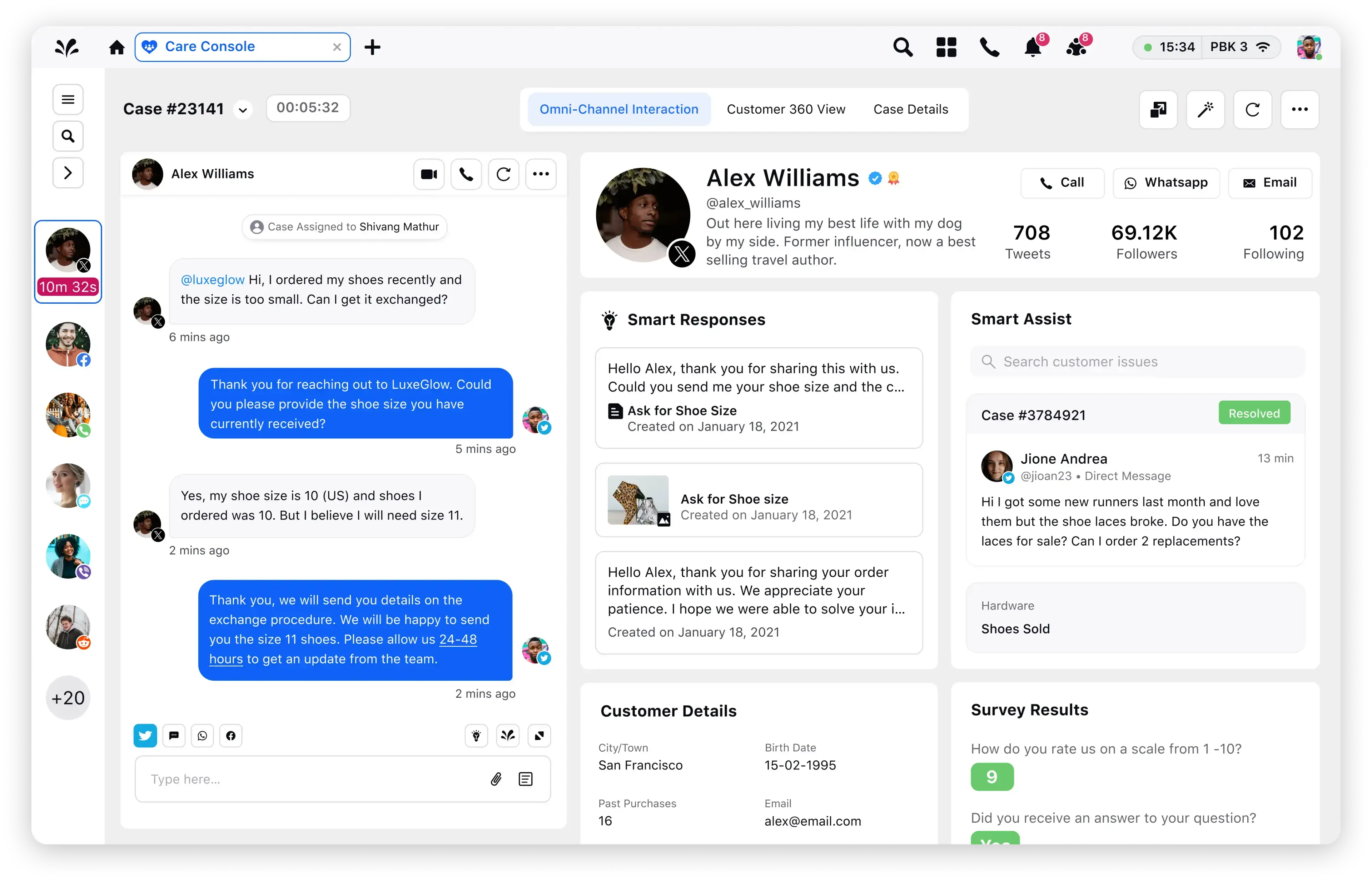The AI-first unified platform for front-office teams
Consolidate listening and insights, social media management, campaign lifecycle management and customer service in one unified platform.

How AI Helps Boost Call Center Efficiency
The impact of AI on call centers has been indelible and undeniable.
Now, with the penetration of generative artificial intelligence (genAI), voice interactions are poised to become smarter, more adaptive, and more engaging. Not just reactive and prompt-activated, but intuitive and proactive, anticipating customer needs before they are voiced and pre-empting what customers will ask for next - much like an effective and competent call center agent.
The applications of AI in call centers are wide and varied, from call distribution to call quality monitoring, and optimizing outbound dialing to agent productivity. From a business standpoint, AI can bring unimaginable scale, personalization and efficiency – optimizing your call center KPIs and lowering operational costs substantially.
To get started, explore these 6 top applications of AI in call centers right away.
- How to use AI in call centers: 6 Use Cases + Benefits
- 1. Generative AI for personalized agent scripts
- 2. Smart call routing
- 3. Dynamic scheduling using AI
- 4. Agent productivity boosters
- 5. Real-time quality monitoring
- 6. Compliance monitoring
- Partner with Sprinklr AI to boost your call center’s ROI and efficiency
How to use AI in call centers: 6 Use Cases + Benefits
Among all the call center technologies prevalent today, AI is arguably the most disruptive. It enables you to handle more incoming calls, perform more outgoing calls, deflect calls to cheaper channels, surface contextual content recommendations and distribute caseload more evenly, to name a few use cases.
Here are the top ways to turbocharge call center customer service using AI:
1. Generative AI for personalized agent scripts
In November 2022, OpenAI democratized ChatGPT and opened it for public use. Among other domains, customer support underwent an upheaval like no other. GenAI-powered products, applications and widgets mushroomed out of nowhere and promised to personalize and humanize customer support conversations in no clicks.
But is it all hype?
Turns out, Generative AI can indeed produce in-the-moment, human-like responses to routine cases and FAQs that are a far cry from bland, robotic responses that have become the hallmark of AI self-serve. In outbound call centers, AI can produce personalized sales scripts that drive sales more effectively than a cookie-cutter script that cuts no ice with the discerning modern customer.
According to the latest call center statistics, 71% of callers expect personalized responses from brands, and 76% get agitated when they don’t get it.
Sophisticated call center software integrates with leading LLMs to ensure your agents have prompt-free responses at their fingertips, reducing caller frustration while waiting for answers. It does so by scraping and analyzing unstructured conversations your callers have all over the web.
Call center scenario | Traditional AI response | GenAI response |
When is the ETA of my flight? | Please punch in your flight number and I will get your flight status. | Allow me XX minutes to check the itinerary and get back to you with your ETA. |
Why is my order delayed? | We are sorry for the inconvenience. The shipping information will be updated soon. | I’m afraid your order was shipped late owing to XX reason. It will arrive by XX date. If it helps, please use this exclusive discount on your next order. |
I want to change my billing information. Please help. | Please call 1-800-xx or get in touch with customer support for this. | Enter your new billing information in this XX format and I will update it. |
💡Pro Tip: How about if your call center agents could modify tonality for every new caller basis their interaction history and sentiment at the time? With solutions like Sprinklr AI+, you can do all of this. GenAI allows agents to choose from a range of predefined tones like professional, persuasive, empathetic and so on – to speak in a tone that appeals to each caller.
Ride the AI curve: Learn how to implement generative AI in customer service
2. Smart call routing
Call routing is another aspect of call centers deeply influenced by AI. Most times, calls are routed basis predefined rules about agent availability and call intent. However, skill-based routing and predicted behavioral routing are largely driven by AI.
In skill-based routing, AI is vital in determining agent skills and scoring mechanisms and ensuring the right calls are automatically routed to the best-matched agents. In the absence of AI, calls would be distributed to the first available agent or the next agent in the queue de facto, no matter their experience or expertise. In that case, resolutions could be delayed, and experiences diminished.
In predicted behavioral routing, AI analyzes the caller’s data from the integrated CRM to figure out their communication channel and purchase history. It then uses the intel to match the caller to the most suitable agent.

3. Dynamic scheduling using AI
Flexible and accurate call center scheduling is foundational to call center success. It entails forecasting call volumes based on seasonal patterns, historical call data and other factors like product launches or marketing campaigns. This is where AI’s processing prowess comes into play.
AI also helps create flex schedules for agents, allowing for remote working, complex work weeks and split shifts. Shift bidding is another facet of scheduling that AI can enable. When you accommodate your agents’ time and location preferences, absenteeism and turnover reduce invariably.
With AI, workforce management becomes more accurate since you are able to predict capacity by running “what-if” scenarios. You can run hypothetical call center scenarios and see their impact on various workforce variables like occupancy and shrinkage. This way, your call center is prepared for all kinds of contingencies and possibilities.
Agile capacity planning and staffing in your call center ensure 100% uptime and enhanced customer engagement and customer satisfaction (CSAT).
4. Agent productivity boosters
Call center agent burnout is a raging problem for modern call centers and a top priority for contact center leaders to resolve in 2024. With repetitive queries, vast caseloads, emotionally charged conversations and multiple call center agent performance metrics to attain, agents need all the help they can get to get their jobs done easily.
Enter AI-led Agent Assist that yields 50% faster resolutions via:
- Unified insights about the customer from all customer touchpoints.
- Similar past cases show what worked and what didn’t in specific customer service scenarios.
- Relevant articles from the knowledge base to help callers with autonomous troubleshooting.
- Guided workflows that offer step-by-step guidance and nudges to agents during calls.
- Auto call summarization and after-call work, eliminating the need for manual note-taking during conversations.
That’s not all. If your agents’ KPIs revolve around lead generation, lead scoring or any other revenue-related activities, AI can be crucial to success. AI-led lead scoring models can prioritize leads based on their conversion capacity and potential.
But how?
AI processes vast datasets of past customers and identifies trends and characteristics indicative of high-value prospects. Agents can focus on promising opportunities and deliver on their SLAs by scoring more MQLs and SQLs.
5. Real-time quality monitoring
AI is a veritable game-changer when it comes to call center quality monitoring. Using it, supervisors, managers and quality analysts can track, measure and optimize agent performance in real-time.
How does this happen?
AI can generate call center agent performance scorecards outlining:
- Performance metrics, including first call resolution and average speed of answer
- Competitive benchmarking at agent, team and industry levels
- Goal alignment with organizational objectives and customer service metrics
- Creative, constructive feedback and live coaching sessions to improve agents’ technical skills and soft skills, such as customer empathy and problem-solving
6. Compliance monitoring
Last but not least, AI ensures call centers meet regulatory compliance requirements around data privacy and security. AI safeguards customer data by data masking and encryption, which prevents data leaks and compromise from any touchpoint.
With GenAI scraping publicly available data for algorithm training, there have been cases of reported data misappropriation, followed by massive public backlash. That’s where enterprise call center software like Sprinklr AI+ can come in handy. Purpose-built for governance and committed to Responsible AI, the software prevents data sharing of proprietary information with third-party vendors. It also performs risk mitigation by minimizing the possibility of deep fakes and AI hallucinations via techniques like prompt engineering.
Read more: Use Sprinklr’s Smart Compliance to Protect Brand Reputation
Partner with Sprinklr AI to boost your call center’s ROI and efficiency
Customer expectations from call centers and customer support teams are at an all-time high. Voice remains a preferred support channel for customers worldwide, and the call volume shows no sign of declining. Manual call management isn’t equipped to provide the quick, seamless and personalized support that today’s customers crave – and deserve.
AI-first contact center software like Sprinklr Service ticks all the boxes with capabilities and integrations that enable it to:
- Track, analyze and distribute inbound calls based on varied routing logics.
- Generate automated but human-like responses to routine queries, thanks to GenAI integration.
- Develop AI scoring parameters for easy new agent training and feedback mechanisms.
- Pair customers with agents who have case context, skills, and availability.
- Compatible with popular external CRM systems and databases for seamless data exchange.
Frequently Asked Questions
Yes, AI can be seamlessly integrated into existing call center systems through API integration, allowing for enhanced functionalities such as automated responses, sentiment analysis and predictive analytics without disrupting current operations.
AI facilitates predictive analytics in call centers by optimizing:
- Call Volume Forecasting
- Customer Behavior Prediction
- First Call Resolution Prediction
- Agent Performance Prediction
- Resource Optimization
While AI can automate routine tasks and enhance efficiency, the complete replacement of human agents is unlikely. Human touch, empathy and complex problem-solving capabilities remain essential for nuanced customer interactions and relationship building in call centers.
Register for a free trial today and watch your operating costs decrease by 50%.